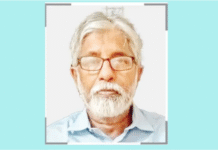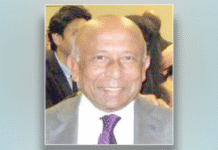Governed entirely by colonialist sick mentality, the Hindutva outfits led by ruling BJP and Siva Sena have been targeting Muslims, Islam, Pakistan, Kashmir, etc in order to increase its Hindu vote bank capacity by getting coverts from Congress and other so-called centrist parties. This is a wild strategy of Hindutva outfits seeking to achieve essentially a hate nation by destroying the secular and democratic infrastructures of India.
Of course, India is moving in a systematic anti-Islamic way, after the demolition of Babri Mosque in 1992 in a crude manner and promoting Ghar vapsi agenda to force people from other religions to “return” or join Hindu bandwagon, now it seeks to do away with Muslim Personal law and if one reads between lines, it is moving towards a fully exclusive Hindutva nation just like its ally Israel is seeking make an exclusive Jewish nation.
BJP and other Hindutva forces operating in the country giant secular and democratic path of Indian nation, are interfering with the courts on the ghastly destruction of Babri Mosque in 1882 the judgment of the “case” is delayed inordinately. These law breakers say they are the Indian law and courts and judges must obey their orders.
The All India Muslim Personal Law Board (AIMPLB), along with several other organisations associated with the Muslim community, has opposed the Law Commission’s questionnaire on the possibility of a UCC, declaring that the move amounts to the Prime Minister Narendra Modi government declaring “war” on their religious rights. The threat of Muslim organisations to “boycott” the law commission process also comes in the backdrop of the Supreme Court hearing a challenge to triple talaq where the Centre termed the custom unconstitutional and violative of gender equality.
Led by the All India Muslim Personal Law Board (AIMPLB), several Muslim organisations on October 13 opposed the law commission’s questionnaire on the uniform civil code (UCC), declaring that the move amounts to the Modi government declaring “war“ on their religious rights. Accusing the government of waging “war” against the community and contending that the UCC, if implemented, will threaten the country’s pluralism, the organisations said they will start a campaign to withdraw the law commission’s move.
The Muslim organisations will launch a campaign to create awareness about this move by the government amongst Muslims from Thursday, beginning with a gathering in Lucknow. “The government is trying to divert attention of people from its failure. We hope it withdraws the move. If it doesn’t, we will decide on our future course of action. At present, we are trying to create awareness among Muslims in the country,” added Rahmani. Women members of the Board, also present at the press meet, stressed that contrary to perception, the personal law balances rights of Muslim women and men “very well” and that there is no need for reforms in it. “There is no need for any reform in the law. Triple talaq is not an issue and the government’s move to impose UCC intends to snatch our religious freedom guaranteed in the Indian Constitution. That’s the reason we are fighting for our rights,” Aasma Zehra, a Board member, said. In a written statement issued later, the Board alleged that the Law Commission’s decision to seek public feedback on UCC is a “calculated” move aimed at disrupting communal harmony and urged all “secular” parties to oppose the step.
The threat of Muslim organisations to “boycott“ the law commission process also comes in the backdrop of the Supreme Court hearing a challenge to triple talaq (divorce) where the Centre termed the custom unconstitutional and violative of gender equality .
One fails to understand how could what Muslim community practices be problem for their survival and how will it matter to them whether Muslims say once or thrice or twice or many more times while performing a divorce of a badly failed marriage, thereby allowing people live in peace.
India has so many serious issues affecting the life of common people, like rising road accidents, liquor malice and related health problems, farmer suicides, etc but the Hindutva forces are still keen to misuse the Muslims for advancing their Hindu vote bank politics. Hindutva forces are damn sure if they target Muslims, more and more Muslims would leave congress party and more and more Hindus would join the BJP and other Hindutva outfits. This political strategy has worked so well for the BJP and outfits that they don’t want to leave this easy route to Hindu vote banks.
Accusing the government of waging “war“ against the community and contending that the UCC, if implemented, will threaten the country’s pluralism, the Muslim organisations said they will start a campaign to withdraw the law commission’s move and Muslim rights are ensured and protected.
Speaking to the media, AIMPLB general secretary Wali Rehmani, Jamiat-Ulema-e-Hind president Maulana Arshad Madani and representatives of Jamaat-e-Islami Hind, Muslim Majlis-e-Mushawarat, Milli Council, Markazi Jamiat Ahle Hadees said all the Muslim sects and women were “one“ on the issue of personal law. Rehmani said he did not agree with the law commission’s claim that the step is an endeavor to address discrimination against vulnerable groups and harmonise the various cultural practices. He said an UCC will end the country’s pluralism and paint all in “one color“and end diversity. “The questionnaire of the law commission is vague and confusing. It gives an impression that the personal laws are responsible for social inequalities and gender disparities and have nullified the rights of women,“ the AIMPLB said.“The intention of the affidavit by the central government on issues of triple talaq, polygamy, maintenance of divorcees and now the questionnaire are all aimed at clearing the way for a uniform civil code,“ the Muslim leaders said.
Now Hindutva parties also take o about secularism when they find the issue useful to force Muslims to accede to RSS ideology of Uniform Civil code by riding over Islamic personal law. Union Minister Arun Jaitley on Thursday asserted that religion cannot dictate upon the rights of an individual and attacked Congress over its stand on the Uniform Civil Code, saying it was the Constituent Assembly controlled by the party that had envisaged a common civil law for all Indians. “Personal law cannot practise, propagate discrimination; cannot allow a compromise with human dignity. Personal law and practices can certainly deal with religion, can dictate upon rituals. The religion cannot dictate upon rights of individuals,” the Finance Minister said.
Senior BJP leader and Indian FM Arun Jaitley said the move was purely an “academic exercise“ and that an UCC will need Parliament’s approval and BJP has no majority in the Upper House. Jaitley also said personal laws of all religions should be “compliant“with individual rights granted by the Constitution, adding that Hindu and Christian personal laws had been amended in the past. “The triple talaq case is not connected to the UCC. Religious practice can apply to rituals of death, birth and marriage. But there should not be discrimination between male and female with regard to inheritance and divorce. The right to human dignity must be protected. Personal laws must be compliant with the Constitution,“ Jaitley said.
The government’s affidavit on triple talaq is a secular approach, an approach that cuts upon religion, he said. He rejected the criticism of the government by various Muslim bodies, saying personal laws have been amended by the various governments and cited the amendment brought in by the first NDA government in divorce laws governing Christians. The Church fully supported it, he said.
The Manmohan Singh government had also brought changes in Hindu Succession Act to bring the woman at par with the man in inheritance, Jaitley told Times Now. Taking a dig at Congress, he said he was “amazed” at its stand as he recalled that the likes of Jawaharlal Nehru and Sardar Patel, who belonged to the party, had envisaged an Uniform Civil Code but did not push it. He added that the Law Commission, which has sought views of various stake holders on the UCC, is carrying out an academic exercise following a judicial order and it was not the government’s decision.
Muslim leaders also sought to counter the government’s stand on triple talaq by claiming the community has reported lesser number of divorce cases vis-à-vis other communities, especially Hindus. Islamic system does not promote divorce and tries to keep the couples together so long as it worked.
BJP is pushing ahead with its UCC agenda mainly because it thinks every Indian Hindu political party opposes Islam as part of Indian ideology and do not support Muslims in any meaningful way. They all want Muslim vote to win polls. BJP and other Hindutva outfits want to use Muslims as India’s pending “problems” to raise the Hindu vote share to win polls. BJP is very bold now because many Muslims, though have left or stopped supporting the Congress party, have not joined the BJP. In Delhi poll Muslims abandoned their traditional but useless “icon” Congress and voted for the newly AAP (Aam Aadmi party) and that badly affected the BJP’s anticipated fortunes. .Congress party which lost the government and every seat it contested in Delhi assembly now feels standing at a crossroads, having lost Hindu and Muslim votes banks in its traditional zone.
However, future is unpredictable for both Congress and BJP even as many Congress men seek an alliance with BJP to reverse its bad fortunes. Both BJP and Congress won’t make any direct poll pacts, however, for some “technical” problems. Congress and BJP plus other Hindutva parties are linked through the RSS and hence Congress does not oppose BJP in a serious manner. In recently held assembly poll in Kerala, Congress seems to have indirectly helped the BJP win it’s first ever seat in the assembly.
Meanwhile, BJP has taught useful lessons to Congress as it had years ago challenged the Congress if it could “stop BJP’s rise” to power. Since Congress, which fueled the rise of BJP, has certain Hindutva weaknesses, it cannot challenge the BJP now.
Source: EurasiaReview










